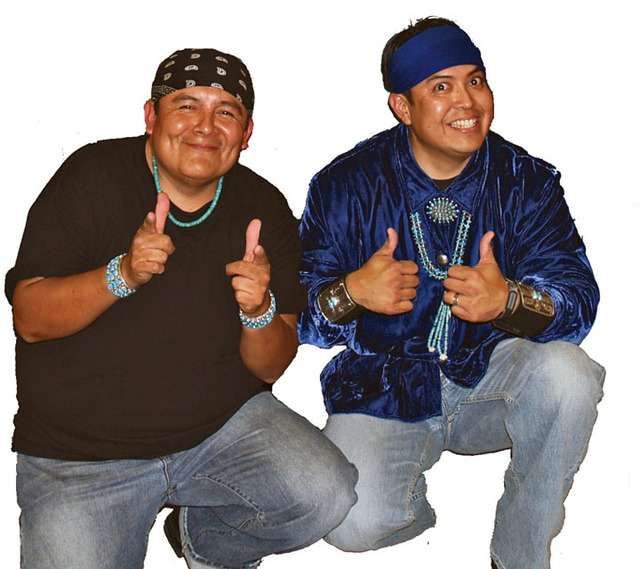Comedians James and Ernie don’t lack for energy. And when I first saw their act at the All Nations Comedy and Music Revue in 2007, neither did the audience. Held at San Felipe Casino Hollywood, the revue primarily drew residents of nearby pueblos, and they lost their collective mind over the duo’s Native American-centered humor. I was also struck by the importance of fry bread. Fry bread, be it the difference in texture from clan to clan or the difficulty in finding a mate who makes it like your mom, factored somehow into nearly every story they told. Fry bread, James and Ernie explain to me in a phone interview, is the mortar that holds us together. Navajos, Pueblos, they all have it in common. No indigenous person will ever put honey and sugar on it, they say. The sweetness is in the hands that make it. Ernest Tsosie III and James Junes comprise what they call the first Navajo comedy duo. Both born and raised on the Navajo Nation (James is from Shiprock, N.M., Ernie from Window Rock, Ariz.), they’ve worked as a team since meeting backstage at a Native comedy competition in Farmington. James won, and Ernie was first runner-up.Their act is dynamic, a mix of parody, sketches, songs and reservation humor. While the response is almost always very positive, some elders have expressed concern about the duo’s treatment of traditional beliefs. For example, the Native car gag. “You know it’s a Native car,” Ernie says, “when you try to start it and it sounds like a medicine man— heya heya ah ahh .”Mostly, though, the elders in the communities they’ve visited have encouraged the team, saying that soon the old generation will be gone, but people like James and Ernie can be a voice for Native peoples in the world.Part of that voice is one of abstention. Both comedians have changed from their days of, as James calls it, “drinking and drugging.” Their sobriety is a huge focus of both their stage work and outreach. Their faces appear on billboards sponsored by the state of New Mexico in cooperation with tribes. The message on them is simple: “We care if you die in a drunk driving crash tonight.” When he was only a few months old, James lost his father in a crash. Now he and Ernie are both fathers, and they say they want to avoid the “do as I say, not as I do” style of parenting. Their desire to be positive role models for their children extends to all Native children. This message, cloaked in comedy, has had a perceptible effect. While touring, they met a security guard at a reservation high school who had been sober for two years and thanked James and Ernie for the inspiration to keep going. For James, it’s one of his favorite moments on tour. Ernie agrees but says that getting to perform at the Kennedy Center was also a highlight. Granted, it was on one of the small stages, but the duo arrived at the famed performance space in a limo. They wanted to share it with the world, but Ernie says, “It was just us,” with no friends or family around, so they asked the limo driver to take a picture of them in front.I ask them what kind of sitcom, if given the chance, they’d like to produce, and it’s something they’ve begun to think about as their popularity has increased. Ernie sees a show like “Friends,” but on the reservation instead of New York City. James is interested in a story about an old guy living traditionally in the city, refusing to become a part of modern life. Instead, he lives in a hogan in the back of a relative’s house, maybe his kid’s, and lives off of Spam he takes from the kitchen. I suggest that maybe their shows could air back-to-back, comprising an hour of Native comedy on TV. James agrees and doesn’t discount it as a possibility. “Things seem to be going that way,” he says. James and Ernie are ready, and they think America is, too.
James and Ernie will perform at Gathering of Nations on Friday, April 24, at 2:30 p.m. and on Saturday, April 25, at 9:35 p.m. Both performances will be at Stage 49. See our guide for more information.






